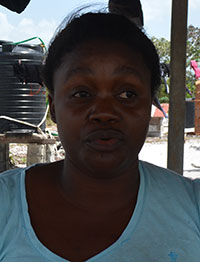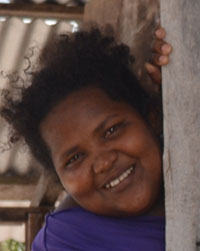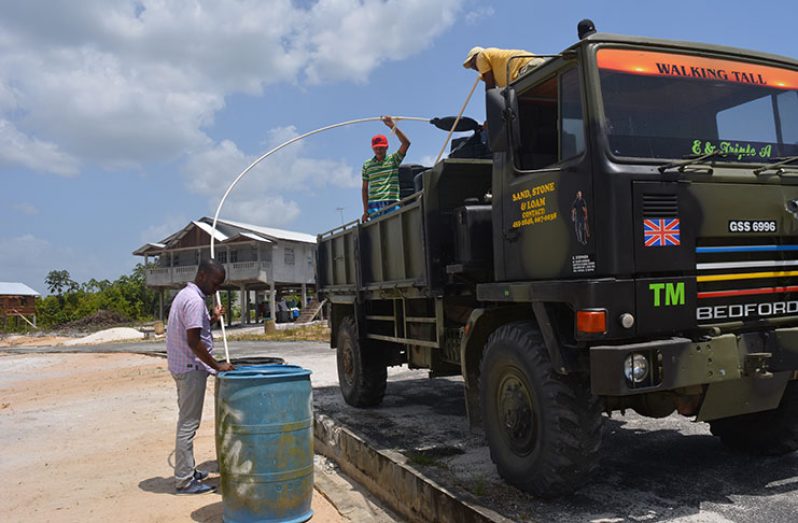– Bartica Council steps in amid extended dry season
FACED with an extended dry season, residents of Five Miles Housing Scheme are struggling

to cope with limited access to water.
Situated five miles from Central Bartica along the Potaro Road in the Cuyuni-Mazaruni District, the housing scheme lacks basic necessities including access to potable water and electricity.
To survive, residents depend heavily on the rain but it has been days since it last rained in the community, leaving them at the mercy of suppliers who charge as much as $8,000 for a tank of water.
But for 27-year-old Toshana Semple and her family, $8,000 is hard to come by at times.
“Right now we don’t have any drinking water,” Semple said as she pointed to her empty tanks and drums.
Over the weekend, the mother of one had to seek the help of a neighbour for a few bottles of drinking water but when that is exhausted, she would have to settle for creek water located more than 30 minutes away from the Housing Scheme. “It may not be safe to drink but we aint get no choice,” she murmured.

After spending millions of dollars to construct her house, 33-year-old Odessa Primus said relocating to Central Bartica may be the next best option.
“I have been living here since November 2016 and since then it has been a real struggle,” the mother of four said as she complained bitterly.
“It does be real hard, especially for people with kids….Every day, you have to cook, you have to clean…it’s hard man, real hard. Imagine,I does got to take my clothes to Bartica to wash because we have no water here,” she lamented.
Because of the situation in the Five Miles Housing Scheme, Primus said she is seriously considering relocating to Central Bartica to take up residence in a rented house.
“I don’t know how long I could do this for…the majority of people have evacuated their homes to go to places where they can get water, I may have to do the same,” she said.
Though the Bartica Mayor and Town Council only supply the housing scheme with water during the dry season, Primus said they are grateful for the assistance.
“We must say thanks to the Council, and Mr. Mayor;he is working very hard, from the time that I am in here. The people mostly talk about him bringing water. He is the only source of water in here, the only source,” Primus posited.
On Saturday last, the Mayor of Bartica, Gifford Marshall spearheaded a team distributing water to the affected residents.
Marshall told Guyana Chronicle that the Guyana Water Incorporated (GWI) has signaled its intention to drill two wells in area, one at Three Miles, Bartica and the other between Three and Five Miles, Bartica.
“The intention is that those wells will bring some amount of relief to the people of Five Miles Housing Scheme. But in the meantime, Council would have to put some resources towards getting water to the residents because we have an extended dry season going on and we can’t afford to let the residents go through this any longer,” the Mayor explained.
Saturday was the first time for this dry season that the Council has distributed water to the residents of Five Miles Housing Scheme. “Once it’s raining, we don’t bring water here,” he posited, noting that residents will be supplied twice a week with water until the extended dry season ends. However, it is not recommended that the water be used for consumption.
Marshall said the Council is making this extra effort to assist the affected residents despite its limited finance. This exercise is costing the council close to $400,000 a week.
“In one day you will have to make about five trips and then you will have to return the next day for another five trips. It is something that we didn’t budget for but like I am saying, we just want to bring some relief to the residents of Five Miles Housing Scheme,” the Mayor noted.
He bemoaned the fact that the community lacks basic services. “It is unfortunate because these residents paid millions of dollars for their properties and all they have is a road. No water, no electricity and the basic services are absent.”
Commenting on the water situation, Ramchand Jailall, GWI’s Planning and Implementation Director,said GWI would have encountered difficulties while drilling the well.
“They (have) encountered heavy rock formation. So now they are upgrading the rig so they could go back to continue drilling because it is not clay, it is rock, so they now have to penetrate through those rocks to determine if there is water bearing stratum below those rocks,” Jailall explained.
According to him, within two to three weeks GWI will be able to determine if there is water-bearing stratum in the identified area. If the exercise proves to be futile, Jailall said another area would have to be selected.




.jpg)










